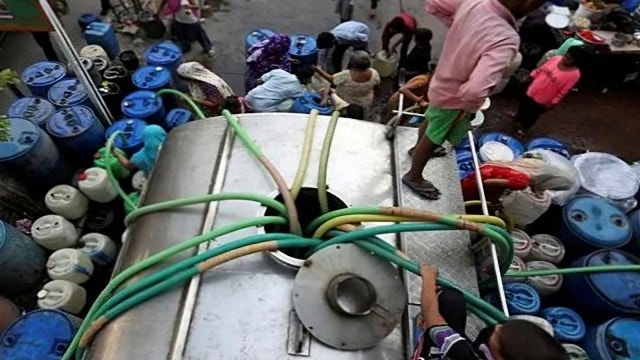Click here to join Express Pune WhatsApp channel and get a curated list of our stories
Pune residents fork out thousands as water tankers become annual summer fix
While residents of apartments and other buildings in Pune say they deal with shortage of water and erratic supply, authorities assure they are 'working on the infrastructure front'.
 Water tanker suppliers are making huge profits, with tanker prices of approximately Rs 1,000. (Source: Special Arrangement)
Water tanker suppliers are making huge profits, with tanker prices of approximately Rs 1,000. (Source: Special Arrangement)Written by Tanisha Kunden and Shubham Kurale,
As summer intensifies, residents of suburbs in Pune are struggling year again with severe water shortage as borewells are drying up and supply from civic bodies is forcing them to rely on expensive water tankers, raising their monthly household budgets.
Residents of areas like Viman Nagar and Kharadi say that without urgent action, including better pipelines and stricter water distribution, these areas could become unliveable. While Pune and Pimpri Chinchwad Municipal Corporations said they have tried to ensure year-round water supply, summer months have become a pain point for citizens.
“To address the demand-supply gap in the Gram Panchayat area, we are providing water tankers as much as possible. Areas such as Undri and Pisoli are water-stressed during summer, so a new water pipeline will be laid for a continuous water supply. We are working on the infrastructure front such as in Viman Nagar, two tanks have been constructed, and testing is currently underway,” said Nandkishore Jagtap, Chief Engineer (Water Supply Department), Pune Municipal Corporation.
‘Sustainable water management policies’
In Viman Nagar, residents say they are struggling with severe water shortages as supply continues to shrink.
Alan Bodhak, 23, a resident of Green Fields Society, Viman Nagar, said, “Every summer, we face water shortages, but this year has been particularly harsh. Our society, like many in Viman Nagar, now gets only four to five hours of water daily, compared to six to eight hours earlier. The erratic supply makes it difficult to plan daily chores like washing, cleaning, and bathing. Residents are forced to adjust their schedules around the unpredictable water flow, often waking up early or staying up late just to manage essential household tasks.”
“To cope, we rely on private water tankers, costing Rs 1,500 to Rs 2,000 each, adding to our expenses as demand drives prices up. What’s frustrating is that this isn’t new — every summer, we face the same ordeal, yet authorities fail to provide a lasting solution. Despite repeated complaints, no real change happens, forcing us to pay more for a basic necessity. This cannot continue. We need sustainable water management policies to prevent this recurring crisis,” Bodhak adds.
Residents say they have tried to conserve water but the recurring crisis demands urgent government intervention.
Rohan Wagh, Secretary, Green Field Society, says, “We’ve imposed water rationing, installed flow restrictors, and encouraged conservation, yet the crisis persists every year. Authorities offer excuses instead of action. The administration must improve supply networks, build reservoirs, and promote large-scale conservation. The burden of managing shortages shouldn’t always fall on residents. We need a long-term solution for a reliable water supply.”
Pranav Marne, a resident of Sunshine Society, Kharadi, says, “The water crisis in Kharadi has worsened. Our society relied on borewells, but they have dried up completely, leaving us fully dependent on tankers. This has increased our monthly expenses by nearly 40 per cent, with each tanker costing Rs 2,000 and prices rising further. Despite ongoing large-scale construction, no thought is given to water management. Residents are forced to ration water reusing it for plants, limiting bathing, and reducing laundry. Yet, we still pay extra for a basic necessity. Authorities must wake up and address this failing system.”
“We need immediate intervention from the local administration. Whether it’s improving water pipelines, enhancing rainwater harvesting systems, or implementing stricter water distribution policies, action must be taken. Otherwise, Kharadi will soon become unliveable due to the worsening water crisis,” Marne adds.
Omkar Kanade, a resident of Shakuntala Kanade Park Society in Undri, says the area was under the Gram Panchayat, and alleges that after PMC took over, water problems have worsened. Kanade, an advocate, says water is supplied for only 10 minutes every alternate day, and no new pipelines have been installed. As a result, water tanker suppliers are making huge profits, with tanker prices of approximately Rs 1,000, he adds.
“Due to hard water, we experience many issues, such as skin problems, health concerns, and even hair loss. Additionally, maintaining taps in our house has become costly. We have to spend at least Rs 600 per bathroom for repairs. For an average middle-class family, this is difficult to afford. Unless the government takes action, nothing will change,” says Kanade.
Hollow poll promises
Residents in other parts of Pune such as in Wakad, Rahatani, Pimple Saudagar, Thergaon, and other areas face the same issue.
“For the past five years, we have needed around five water tankers daily every March, April, and May for domestic use. Also, there’s an issue of low water pressure and price rise of tankers in May as demand surges. A significant portion of our budget is spent on hiring tankers ultimately hampering the development of the housing societies. We demand a regular water supply throughout the year,” said Santosh Shinde, a resident of Kalpataru Splendour in Wakad.
“Before every election, candidates promise to solve the water crisis, but rarely any work is done to resolve them, once elected. There are days when we also use water from ‘fire tanks’ meant for emergencies. Societies have mandatory water harvesting plants, but some do not use them, causing water shortages later,” says Omkar Annegirikar from Sukhwani Shiv Om Society in Kiwale.
“To solve this issue, we need a multi-pronged approach, as we need to work on behavioural change such as avoiding illegal water connections and promoting the use of native plants and drought-tolerant landscaping to reduce water consumption for irrigation. The administration must avoid discharging untreated sewage into rivers as it significantly reduces their river’s carrying capacity and causes water shortages,” adds Annegirikar.
(Tanisha Kunden and Shubham Kurale are interns with The Indian Express.)
Click here to join Express Pune WhatsApp channel and get a curated list of our stories












